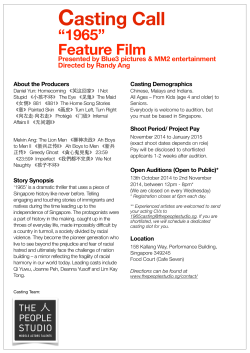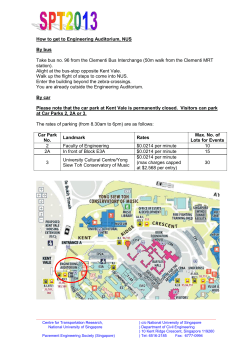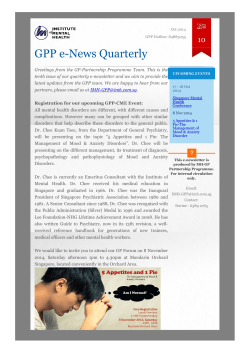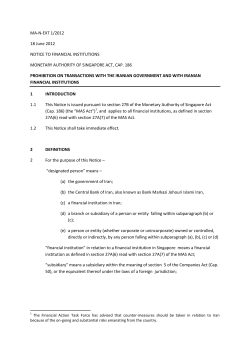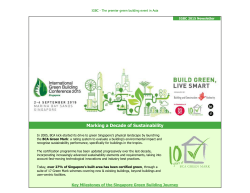
MAD CAD JEM-ing Up a Green Mall in the West OUT
ABOUT MAD CAD JEM-ing Up a Green Mall in the West Harmeet Pal Singh shares his design experiences Pg. 2 – 3 Human’s Ecological Footprint Understanding what this means Pg. 4 Some Green Facts About Singapore Pg. 5 Let’s Build Green! Take a peek at other green buildings that have won accolades Pg. 6-7 What’s new in AcePLP? Check out The Bulletin about our revamped CADPRO website. Pg. 8 Mar 2013 Issue JEM -ING IT UP IN THE WILD WILD WEST Harmeet Pal Singh shares his experience of working with the designers of JEM, a green mall due to open in Q2 of 2013. While we continue to populate Singapore’s landscape with buildings to fulfill our residential, leisure and functional needs, Singapore actively looks to sustainability to negate the developments’ impact on the environment, making green buildings all the rage now. Even as we speak, yet another green building is work-in-progress. This one comes in the form of a futuristic green mall, well on its way to serve the shopping needs of those living in the surburban west of Singapore. Introducing to you Jurong East Mall (JEM), one of our clients SAA’s most esteemed concepts, where our CAD Engineer, Harmeet, had been assigned to assist for a span of 6 months during his Traineeship. What was your role in this project? Did you play a part in the design aspect of it? I was mainly involved in detail drawings, GA amendments, setting out and sectioning, and worked directly with anyone who needed support. While I did not do the actual design work, a large part of my time was spent assisting one of the design teams in charge of designing the highlight of JEM, the Cascading Skypark. The team dealt mainly with the hardscape aspects; benches, metal gates, drainage, maintenance areas etc. Did you learn about design then? Through my work with the team, I learned a lot about green design and the preferred design standards for usual building features like catwalks, ramps and toilets. I would join their design meetings to learn more about their considerations when designing specific areas and picked up useful tips on what is important in designing a building. I also learned about the various regulatory bodies in Singapore and the types of regulations imposed on building designs, such as disability codes and the service maintenance regulations. These are important because our government is most concerned about whether a project adheres to the regulations. JEM won the Green Mark Platinum award, for being one of the most sustainable mixed-used assets in Singapore. Can you share with us what’s so outstandingly green about this mall? JEM harnesses highly efficient air-conditioning systems, regenerative lifts, and a wide usage of LED lighting. The office tower also consists of a side atrium to deliver natural light into the office space, reducing the need for artificial lighting during the day. Extensive sky-rise greenery is also used to reduce the façade’s heat absorption, playing a significant role in keeping the building’s temperatures low and thereby decreasing power consumption by the airconditioning. All these design features will help JEM achieve a reduction in its energy consumption equivalent to that of 2,400 HDB apartments annually. Water consumption will also be cut down by approximately 250,000 cubic metres (100 Olympic-size swimming pools) a year. MaC|2 Were there many challenges encountered? Like all companies, meeting deadlines and satisfying the project needs were major issues. So at times, information was not properly passed down to the entire team. This resulted in outstanding drawings with comments that were not addressed, which caused them to be overdue. There were also drawings dating back to the tender period that needed revision, but it was difficult to find the right version to revise because of poor filing, documentation and handover. I managed to spot these problems by proactively enquiring with my supervisor and co-workers. While my curiosity led me to working late nights, I am glad I took the initiative to ask, and keep asking, so that problems were discovered earlier could be resolved fully. Any Takeaways? I definitely took away with me the experience of working closely with a design team. Such knowledge will enable me to better contribute as I can draft more carefully with clearer design considerations. Most importantly, I took away the ability to be relaxed in a fastpaced environment. Watching my supervisors maintain a cool head even when pressured by their clients inspires me. They have always managed to work with a humour despite the rapid momentum at work. It is all about dedication and commitment to perfecting the designs! “ With the experience I gained at our client SAA, I am now more aware of the reasons behind building design features. ” Green Building is an environmentally sustainable building, designed, constructed and operated to minimise the total environmental impacts throughout its life-cycle. HARMEET Harmeet has since completed his assignment with SAA and is currently working on an in-house pilot project which involves the use of 3D laser scanner to reproduce a 3D model of buildings, one of the recent key technological advancements in the construction industry. This world works in a 3D dimension plan of existence with 3 major coordinates – x-axis, y-axis and z-axis. Now imagine the 3D model as cloud of points where each point has ‘x’, ‘y’ and ‘z’ value with a tolerance of 5mm gap. The final product rendered is known as a Point Cloud. In the pilot project, the in-house AcePLP team is currently looking for ways in converting these points, or coordinates, into an actual BIM model. Got an experience to share? Write in to hr@aceplp.com.sg to let us know! MaC|3 Understanding the Ecological Footprint DO YOU The largest component of the Ecological Footprint is the carbon footprint (55%). Carbon Cropland Forest Grazing Land Built-up Land Fishing Grounds ? KNOW In 2012, Singapore contributed to the largest ecological footprint per head in the Southeast Asia region, according to conservation group the World Wide Fund for Nature (WWF). The size of a person’s Ecological Footprint depends on development level and wealth, and the choices individuals make on what they eat, what products they purchase and how they travel. ECOLOGICAL FOOTPRINT (DEMAND) = Population x Consumption per person x Footprint intensity MaC|4 Some Green FACTS By 2030, our national target is to “green” at least 80% of all buildings, adding on to the other Singapore 2030 goals to strengthen transport network and expand land mass. Why? About 80% of A third of the world’s resources is consumed by the construction and operation of buildings. Singapore's electricity is currently generated from natural gas as fuel. In a typical Singapore building, 60% of the electricity is used to power air-conditioning and another 15–20% for lighting The top energy guzzlers in Singapore are the Supermarkets, Retail Malls and Data Centres. A third of the world’s resources is consumed by the construction and operation of buildings. Let’s work towards conserving efforts. MaC|5 Let’s Build GREEN You may not have realised it, but Green Buildings have been around Singapore for quite a while…Take a peek at some of the green features they sport! Republic Poly 1 Green Wall & Roof @ multi-storey carpark • Creepers grow on vine trays acting as “bio-lungs”, absorbing CO2 & releasing O2 • Helps cool the air in and around the carpark, reducing the effect of a “heat island” 2 Sunshade Louvres • Perforated aluminium sunshades & Ceramic frit glazing • Reduces solar radiation & heat load 3 Thermal Energy Storage (TES) • Allows for “storing of cooling energy “into the specially designed storage tank during the night, which incurs lower utility costs • The stored “cooling “ energy is then used to cool the building during the daytime. •TES technology thus minimises the need to run the air-conditioning plant during the daytime, reducing the demand for the more expensive daytime electricity. MaC|6 Changi Airport T3 Reflector panels for Skylights in the Roof Internal • Automatically adjust themselves to let in optimal amount of soft & uniform sunlight ITE College East External • Lights up by reflecting beams of light built along the roadside for vehicles • Road lights serve dual purpose Low-emissivity performance glazing and laminate double-glazed curtain-wall • Maximise day lighting • Reduce energy consumption Water Landscaping • Lower surrounding temperatures • Reduce energy consumption 1 313@Somerset Solar Panels • Harness the sun’s energy to power up car-park lightings and barrier system • Generate electricity for the centre’s use 2 Waste Heat Recovery System • Capture heat rejected from the chiller • Reuse to heat up hot water to supply the entire mall’s requirement MaC|7 The Bulletin CADPRO website has been revamped! Visit our CADPRO website to read for the most updated information: Under ‘Quick Access Links’: >>Email helpdesk – click this link to SOS to our inhouse trainers about onsite tasks >>Submission Procedures – refer to this link for the proper submission procedures for leave >>FTP – visit this to search for your processed leave form >>Download Forms - download timesheet etc. here if you run out of hard copies to use …And many more. Explore it today! If you have any feedback regarding information that could be useful to you, but is not there at present, do write in to hr@aceplp.com.sg. CADPRO website is a site in continuous progress! MaC|8
© Copyright 2025
